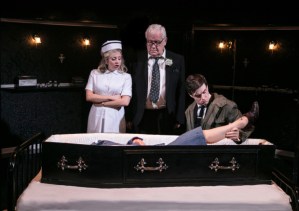Review: The Revlon Girl (Park Theatre)
The Aberfan mining disaster is the catalyst for Neil Anthony Docking’s play
In 1966, 116 school children and 28 adults were killed in a mining accident, where a landslide buried a primary school in Aberfan, South Wales. The event was blamed on the negligence of the National Coal Board, who also happened to be the largest employer in the town. The news sent shockwaves through the country fifty years ago, and now forms the foundation for Neil Anthony Docking's new play, fresh off the back of a run at the Edinburgh Fringe.
Docking introduces us to those left behind, the mothers of the dead, united by their loss. This isn't so much of a story as a powerful snapshot of grief, of women constantly reminded of their experiences yet forced to ask – how do you carry on? How do you move beyond the event? The topic is brimming with complexity and tragedy, more than is ever really possible to pack into an 85 minute running time.
Our way in as an audience is through the titular Revlon girl, invited eight months after the incident to give an instructional presentation on makeup by a selection of the Aberfan mothers, determined to restore a sense of normality. The juxtaposition is stark – costume tailor Beryl Thomas has the Bristolian beautician (Antonia Kinlay, referred to as Revlon throughout), in sharp metropolitan reds and blacks, utterly at odds with the muted colours of the four mothers she visits. From her perspective we come to understand the sadness and emptiness of the Aberfan women's lives.
Docking succeeds by, somehow, mixing the tragedy of the event with very real humour. It is startling to think that, given the subject matter, the audience left the theatre laughing. A lot of this is because the cast perform as a perfectly coordinated ensemble throughout. Bethan Thomas as Rona is the most adept here, bursting with rage while also unafraid to let loose gag after gag. The women tackle the tragedy by carrying on as they were, bouncing through conversational inanity with verve. The play charms, even as it echoes with sadness.
Director and long-term Docking collaborator Maxine Evans allows the script and the concept to do the majority of the heavy lifting, unafraid to leave her characters still for extended passages. For a topic less enthralling it would seem uninspired, but, in the case of The Revlon Girl, any more than this would be distracting. Designer Eleri Lloyd's most subtle decision was the most successful – a leaking skylight adding a slow, metronomic tapping for the duration of the performance. Drip after drip raining down onto the stage from the ceiling. You could hear the emptiness of the silences with the ring of an unfilled bucket. Considering the play is so dense, even more of these silences would not go amiss.
It's hard to miss the play's relevance. Even though the sadness and grief of the Aberfan women was the main theme, it is tinged with a bubbling anger: "It was all about money. The cheapest solution. No one gave a s**t about us", one of the mothers retorts. After the events in west London earlier this year, this hits home. When it comes to infrastructure, the human cost always outweighs the financial savings.
The Revlon Girl runs at the Park Theatre until 14 October.
















